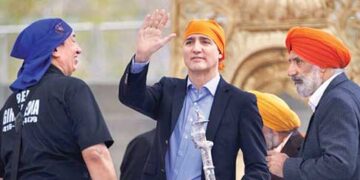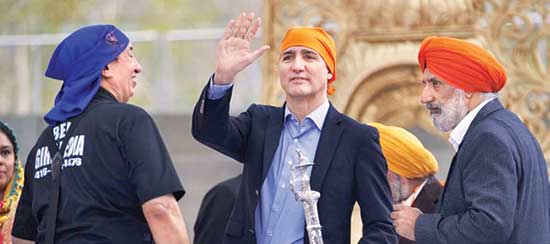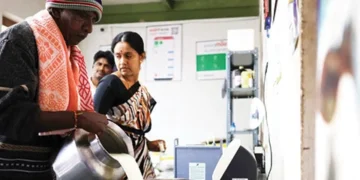 REPEATED immature politicking by the Canadian Prime Minister Justin Trudeau by attending Khalsa Day celebrations in Toronto has led to a fresh diplomatic row between India and Canada. Disturbingly, in the presence of Trudeau, Sikh separatist slogans were raised.
REPEATED immature politicking by the Canadian Prime Minister Justin Trudeau by attending Khalsa Day celebrations in Toronto has led to a fresh diplomatic row between India and Canada. Disturbingly, in the presence of Trudeau, Sikh separatist slogans were raised.
It is evident that Canada, under Trudeau, is acting in a brazen manner in an apparent bid to woo Sikh voters to form a strong numerical electorate, especially in Northern Canada in support of Trudeau and his party. This signals that political space has been given to separatism, extremism and violence in Canada. This also fosters an atmosphere of violence and criminality, to the detriment of its own people.
Irresponsible act
It may be recalled that Trudeau flew (on April 28) to Toronto from Ottawa and politicised the event without caring for the damaging consequences that India and Canada will suffer by fuelling the cause of Sikh separatism.
The leaders of Canada’s two major Opposition parties – Pierre Poilievre and Jagmeet Singh – also spoke at the event. A video of Trudeau’s remarks shows spectators shouting “Khalistan Zindabad” (long live Khalistan) slogans, referring to the movement to establish a separate Sikh homeland. Late last year, Trudeau earned India’s ire when he announced in the House of Commons that Canada was actively pursuing credible allegations that India was directly responsible for the murder of Hardeep Singh Nijjar in June 2023 outside a Gurdwara in Surrey, B.C.
Reacting sharply to Trudeau’s active participation at the separatist-linked event in Canada, India summoned Canadian Deputy High Commissioner to the Ministry of External Affairs, New Delhi, and protested vociferously. As it is, India-Canada diplomatic relations are at their lowest, with both sides downsizing the number of diplomats in their respective missions. Trudeau has further irked India by announcing that the Canadians would always be there to protect the Sikhs’ rights.
Unsubstantiated charge
Meanwhile, Washington Post, perceived to be an anti-Indian newspaper, accused the Indian intelligence services of two assassination plots in the Canada and US, alleging that an officer in India’s intelligence service was directly involved in a foiled plan to assassinate a US citizen, who is one of Indian Prime Minister’s most vocal critics. It further charged that the officer was also involved in the shooting death of a Sikh activist last June in Canada.
India’s Foreign Ministry said the Washington Post report had made “unwarranted and unsubstantiated imputations on a serious matter”, while New Delhi is investigating the issue. Last November, US authorities had said an Indian government official had directed the plot in the attempted murder of Gurpatwant Singh Pannun, a Sikh separatist and dual citizen of the US and Canada. India has denied any complicity, saying it would formally investigate the concerns of the US, and take ‘necessary follow-up action’ on the findings of a panel set up last year.
Back-channel diplomacy
It appears that the US was ceaselessly targeting India when the latter was in midst of its parliamentary elections. It would seem that the West is likely to further intensify its pressure on India on some pretext or the other in order to take away the country’s sheen. Problems are solved through backchannel diplomacy and quiet maneuverings. However, the West has clearly departed from this age-old practice by maintaining double standards and making unsubstantiated allegations against India.
The US, in the past, had brashly toppled governments in South and Central America. Since the media did not hype it then the actions escaped harsh criticism by the international community and even the UN. The West would do well to look at its own tainted track record before making wild allegations against other countries, which are well within their rights to defend their integrity and security


























